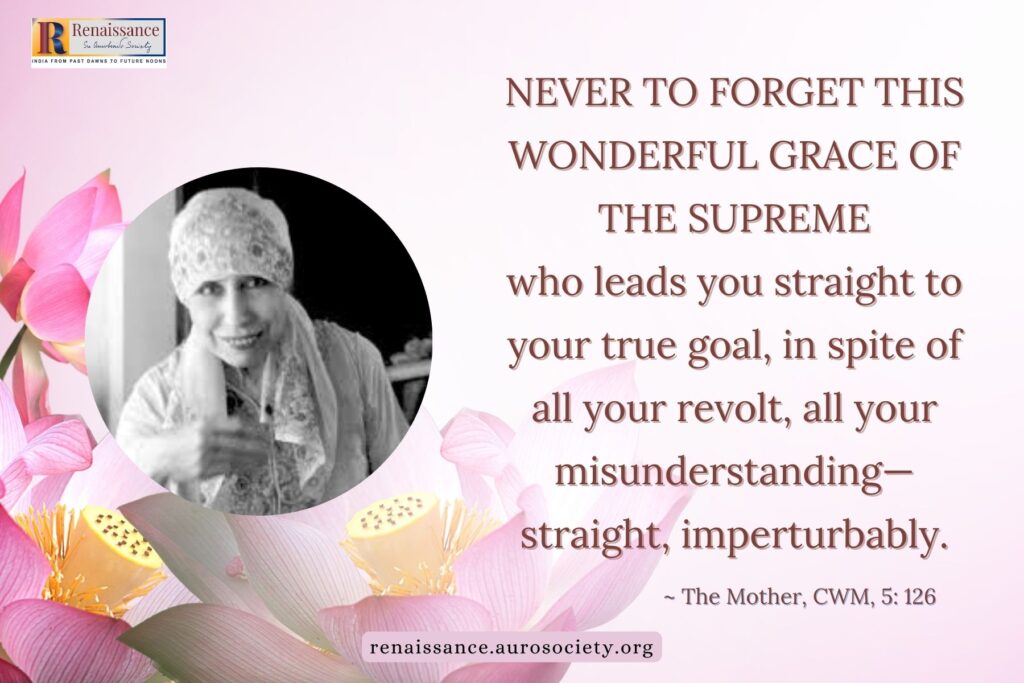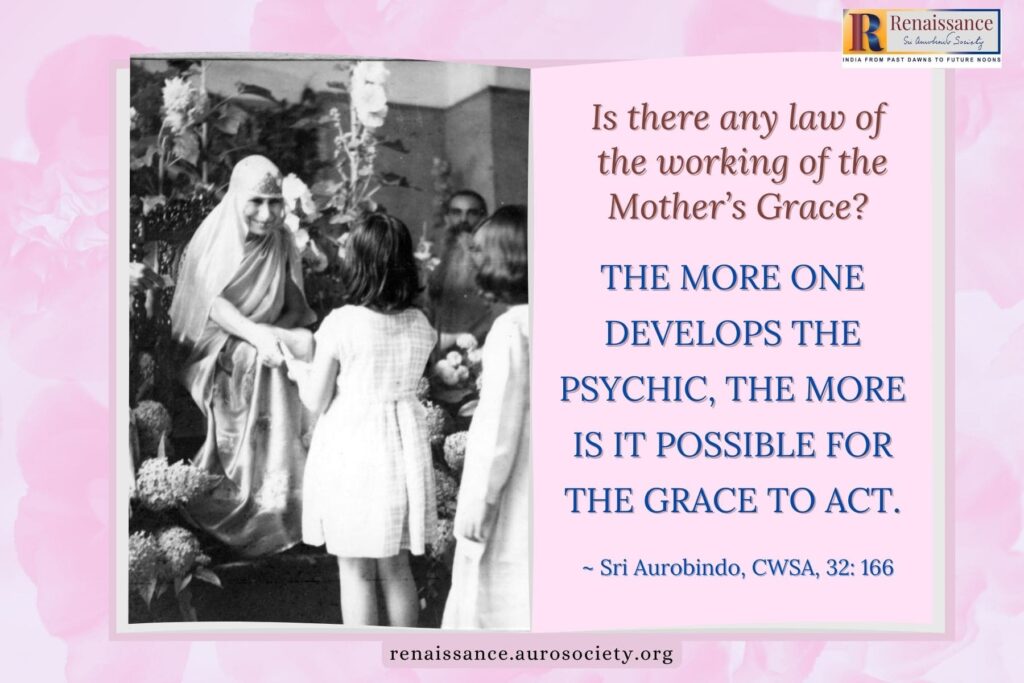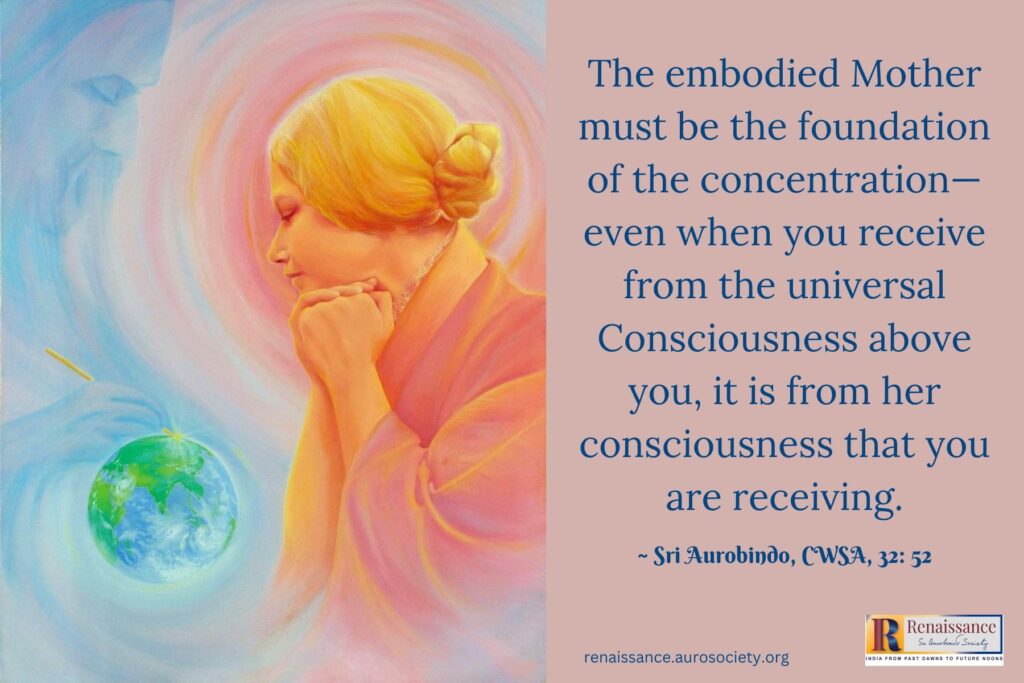Editor’s note: In our Sunlit Path feature we highlight a few letters of Sri Aurobindo in which he guides the sadhaks on the right place of friendship and affection in the path of Integral Yoga. Extremely helpful is his penetrating insight into the nature of human love that is primarily a movement of the vital ego.

Not an Ascetic Yoga
All are not indifferent in this Asram to each other, nor is friendship or affection excluded from the Yoga. Friendship with the Divine is a recognised relation in the sadhana. Friendships between the sadhaks exist and are encouraged by the Mother. Only we seek to found them on a surer basis than that on which the bulk of human friendships are insecurely founded.
It is precisely because we hold friendship, brotherhood, love to be sacred things that we want this change—because we do not want to see them broken at every moment by the movements of the ego, soiled and spoiled and destroyed by the passions, jealousies, treacheries to which the vital is prone—it is to make them truly sacred and secure that we want them rooted in the soul, founded on the rock of the Divine.
Our Yoga is not an ascetic Yoga: it aims at purity, but not at a cold austerity. Friendship and love are indispensable notes in the harmony to which we aspire.
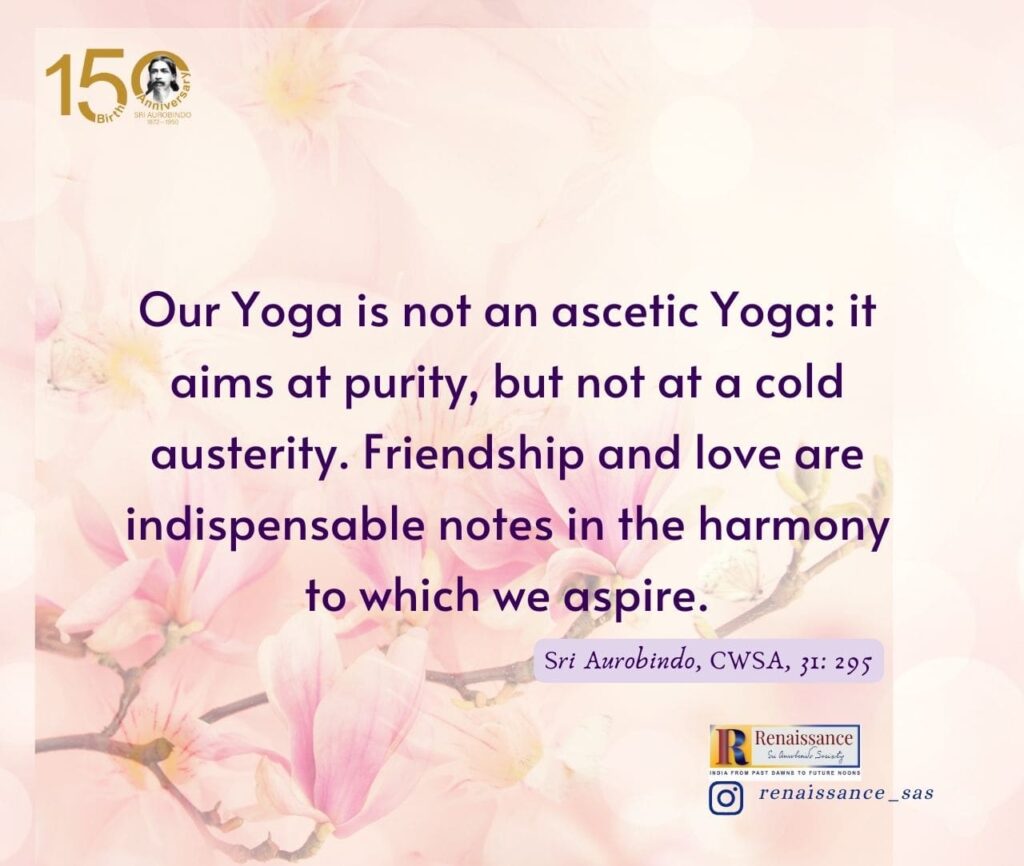
It is not a vain dream, for we have seen that even in imperfect conditions when a little of the indispensable element is there at the very root the thing is possible. It is difficult and the old obstacles still cling obstinately. But no victory can be won without a fixed fidelity to the aim and a long effort. There is no other way than to persevere.
~ Sri Aurobindo, CWSA, Vol. 31, pp. 294-295
* * *
All Attachments Have to be Given Up
In Yoga friendship can remain, but attachment has to fall away or any such engrossing affection as would keep one tied to the ordinary life and consciousness—human relations must take quite a small and secondary place and not interfere with the turn to the Divine.
* * *
. . . in Yoga all attachments have to be given up so that there may be no rival to the Divine, but love and affection can be there—only as a new basis of consciousness has to be reached love and affection have to be rebased on that deeper and higher consciousness, not allowed to remain in their old form or on their old level—all the life must be centred round the Divine.
It is so in this Yoga at least. There are others in which a man must become aloof from all things, but that is when one is bound towards Nirvana.
~ Sri Aurobindo, CWSA, Vol. 31, p. 295
* * *
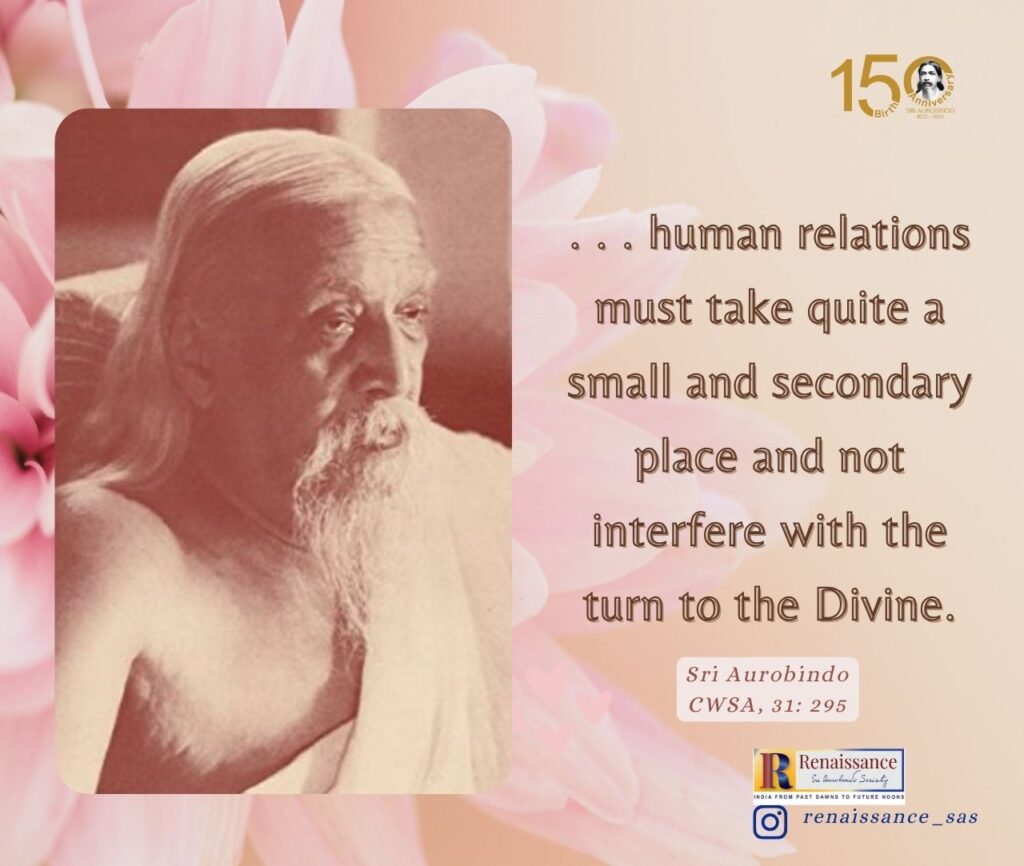
Human Affection is Unreliable
Human affection is obviously unreliable because it is so much bound up with selfishness and desire; it is a flame of the ego sometimes turbid and misty, sometimes more clear and brightly coloured—sometimes tamasic based on instinct and habit, sometimes rajasic and fed by passion or the cry for vital interchange, sometimes more sattwic and trying to be or look to itself disinterested.
But fundamentally it depends on a personal need or a return of some kind inward or outward and when the need is not satisfied or the return ceases or is not given, it most often diminishes or dies or exists only as a tepid or troubled remnant of habit from the past or else turns for satisfaction elsewhere. The more intense it is, the more it is apt to be troubled by tumults, clashes, quarrels, egoistic disturbances of all kinds, selfishness, exactions, lapses even to rage and hatred, ruptures.
It is not that these affections cannot last—tamasic instinctive affections last because of habit in spite of everything dividing the persons, e.g. certain family affections; rajasic affections can last sometimes in spite of all disturbances and incompatibilities and furious ruptures because one has a vital need of the other and clings because of that or because both have that need and are constantly separating to return and returning to separate, or proceeding from quarrel to reconciliation and from reconciliation to quarrel; sattwic affections last very often from duty to the ideal or with some other support though they may lose their keenness or intensity or brightness.
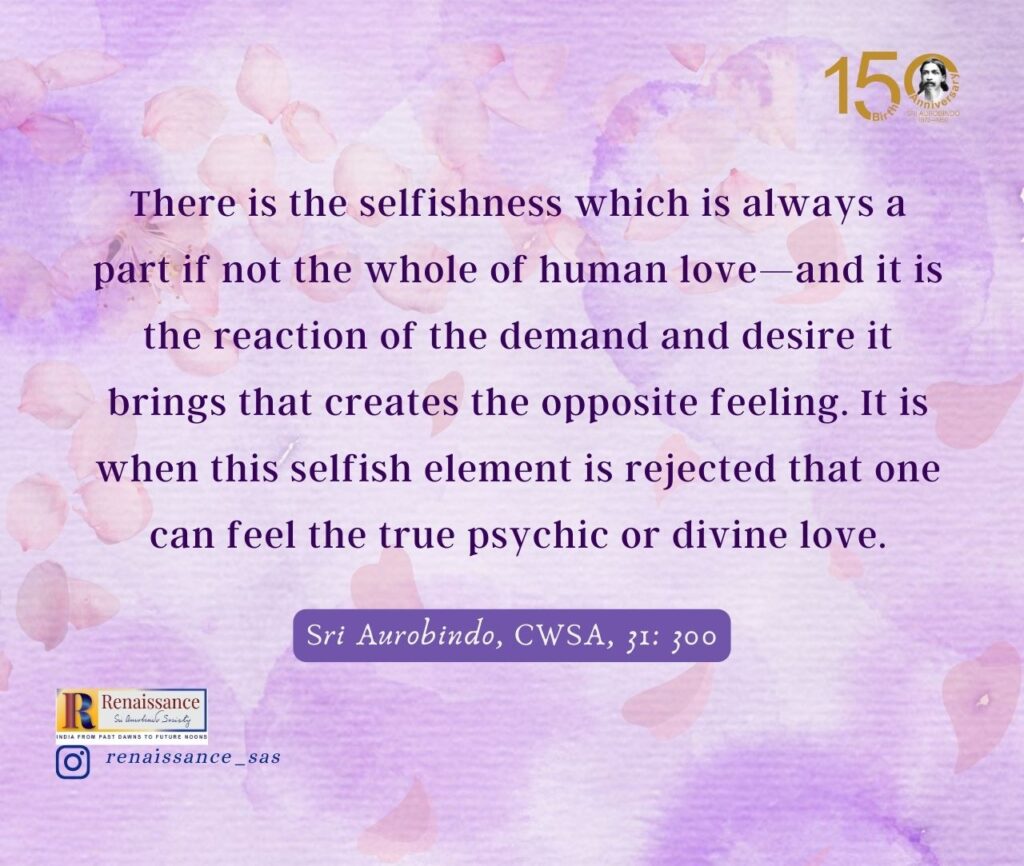
But the true reliability is there only when the psychic element in human affection becomes strong enough to colour or dominate the rest.
For that reason friendship is or rather can oftenest be the most durable of the human affections because there there is less interference of the vital and even though a flame of the ego it can be a quiet and pure fire giving always its warmth and light. Nevertheless reliable friendship is almost always with a very few; to have a horde of loving, unselfishly faithful friends is a phenomenon so rare that it can be safely taken as an illusion.
In any case human affection whatever its value has its place, because through it the psychic being gets the emotional experiences it needs until it is ready to prefer the true to the apparent, the perfect to the imperfect, the divine to the human. As the consciousness has to rise to a higher level, so the activities of the heart also have to rise to that higher level and change their basis and character.
Yoga is the founding of all the life and consciousness in the Divine, so also love and affection must be rooted in the Divine and a spiritual and psychic oneness in the Divine must be their foundation—to reach the Divine first leaving other things aside or to seek the Divine alone is the straight road towards that change.
That means no attachment—it need not mean turning affection into disaffection or chill indifference.
~ Sri Aurobindo, CWSA, Vol. 31, pp. 296-297
* * *
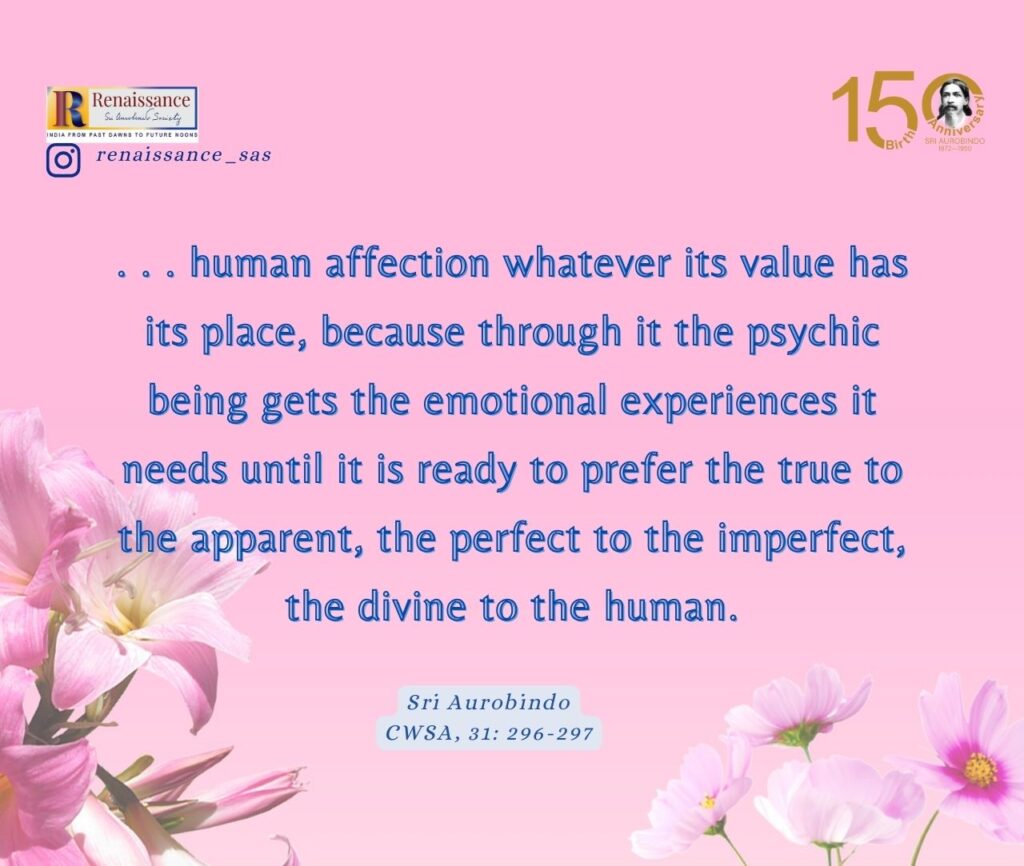
* * *
Vital Love Does Not Last
It is meant [by not retaining vital relations] that you should have the relation of sadhaks with each other, one of goodwill and friendly feeling, but not any special relation of a vital character. If there is anyone you cannot meet without such a vital relation coming up, then only it is not advisable to meet him or her.
~ Sri Aurobindo, CWSA, Vol. 31, pp. 297-298
* * *
It is the ordinary nature of vital love not to last or, if it tries to last, not to satisfy, because it is a passion which Nature has thrown in in order to serve a temporary purpose; it is good enough therefore for a temporary purpose and its normal tendency is to wane when it has sufficiently served Nature’s purpose.
In mankind, as man is a more complex being, she calls in the aid of imagination and idealism to help her push, gives a sense of ardour, of beauty and fire and glory, but all that wanes after a time. It cannot last, because it is all a borrowed light and power, borrowed in the sense of being a reflection caught from something beyond and not native to the reflecting vital medium which imagination uses for the purpose.
Moreover nothing lasts in the mind and vital, all is in a flux there. The one thing that endures is the soul, the spirit. Therefore love can last or satisfy only if it bases itself on the soul and spirit, if it has its roots there. But that means living no longer in the vital but in the soul and spirit.
The difficulty of the vital giving up is because the vital is not governed by reason or knowledge, but by instinct and impulse and the desire of pleasure. It draws back because it is disappointed, because it realises that the disappointment will always repeat itself, but it does not realise that the whole thing is in itself a glamour or, if it does, it repines that it should be so.
Where the vairagya is sattwic, born not of disappointment but of the sense of greater and truer things to be attained, this difficulty does not arise. However the vital can learn by experience, can learn so much as to turn away from its regret of the beauty of the will-o’-the-wisp. Its vairagya can become sattwic and decisive.
* * *
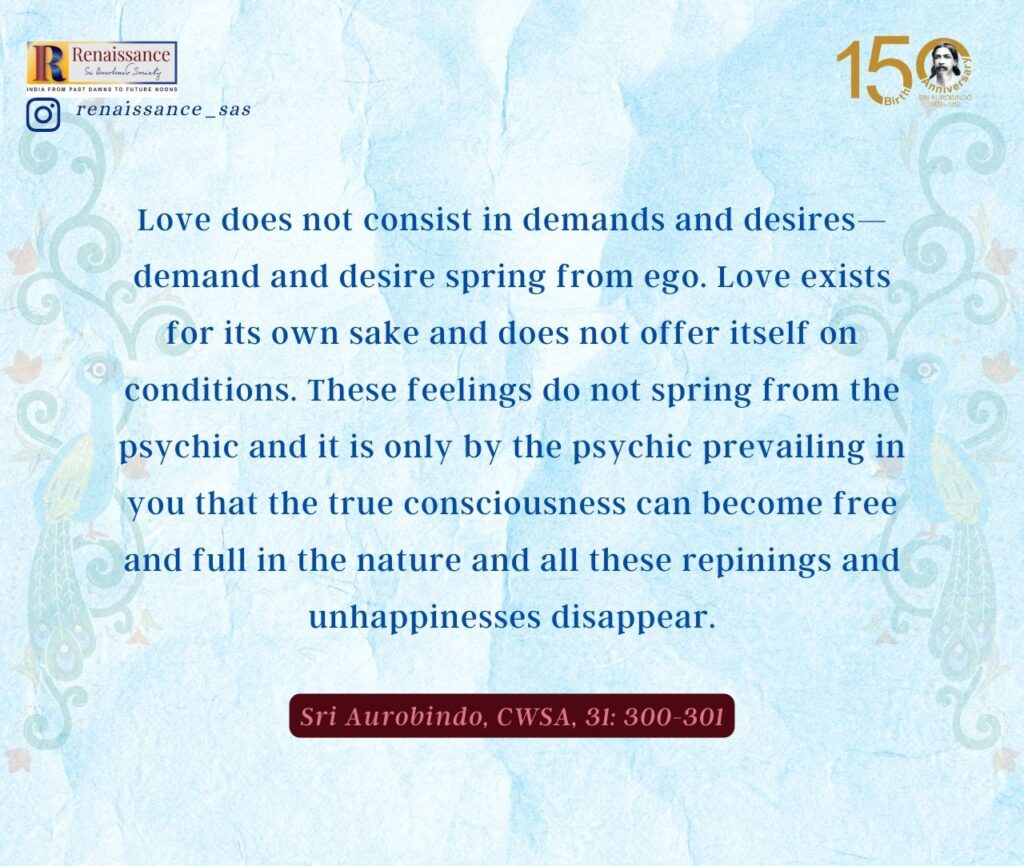
There is nothing unusual in your feelings towards X. It is the way that vital love usually takes when there is no strong psychic force to correct and uphold it.
After the first vital glow is over, the incompatibility of the two egos begins to show itself and there is more and more strain in the relations—for one or both the demands of the other become intolerable to the vital part, there is constant irritation and the claim is felt as a burden and a yoke.
Naturally in a life of sadhana there is no room for vital relations—they are a stumbling block preventing the wholesale turning of the nature towards the Divine.
* * *
Read:
Sri Aurobindo on Family Relations in Yoga
The phenomenon of which you speak is normal to human nature. People are drawn together or one is drawn to another by a certain feeling of affinity, of agreement or of attraction between some part of one’s own nature and some part of the other’s nature.
At first this only is felt; one sees all that is good or pleasant to one in the other’s nature and even attributes, perhaps, qualities to him that are not there or not so much there as one thinks. But with closer acquaintance other parts of the nature are felt with which one is not in affinity—perhaps there is a clash of ideas or opposition of feelings or conflict of two egos.
If there is a strong love or friendship of a lasting character, then one may overcome these difficulties of contact and arrive at a harmonising or accommodation; but very often this is not there or the disagreement is so acute as to counteract the tendency of accommodation or else the ego gets so hurt as to recoil.
Then it is quite possible for one to begin to see too much and exaggerate the faults of the other or to attribute things to him of a bad or unpleasant character that are not there. The whole view can change, the good feeling change into ill-feeling, alienation, even enmity or antipathy. This is always happening in human life. The opposite also happens, but less easily—i.e. the change from ill-feeling to good feeling, from opposition to harmony.
But of course ill-opinion or ill-feeling towards a person need not arise from this cause alone. It happens from many causes, instinctive dislike, jealousy, conflicting interests, etc.
One must try to look calmly on others, not overstress either virtues or defects, without ill-feeling or misunderstanding or injustice, with a calm mind and vision.
~ Sri Aurobindo, CWSA, Vol. 31, pp. 298-300
* * *
The love in the vital or other parts is the true thing, good for the spiritual life, only when in the vital love is changed into a form of the psychic love and becomes an instrument for the transformation of the soul’s love, no longer for the desires of the ego which men call love.
~ Sri Aurobindo, CWSA, Vol. 31, p. 301

~ Design: Beloo Mehra

